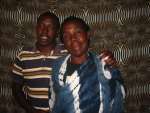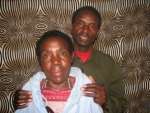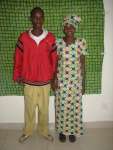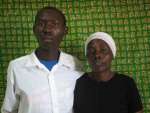Nyiransabimana Verene & Muhoza Desire
As the son of Nyiransabimana Verene, Muhoza Desire is curious about his mother’s past with his father. She is especially curious because Muhoza Desire grew up without his father. He passed away shortly after he was born. Nyiransabimana Verene loved her husband, and they became newlyweds when she was only seventeen. However, her beloved became sick with malaria and passed away when Muhoza Desire was only 5 or 6 years of age. Despite this, she continued to stay strong and raise her three children.
Mukagakwaya Beatrice & Muvunyi Olivier
Muvunyi Olivier has many questions for his mother, Mukagakwaya Beatrice, about how Rwandan culture has changed since her childhood. Mukagakwaya Beatrice provides descriptions of the courtship rituals in the past, dress and behavior during weddings, and the gender norms that governed women’s lives. She tells her son that women today are not as respectful of traditional cultured or their elders. She advises young people to be peaceful and content with what they have. Muvunyi Olivier welcomes his mother’s story and wonders about these traditions in contemporary society.
Mukagakwaya Beatrice & Murindahabi Canisius
Murindahabi Canisius's father died when he was too young to know him well, so he asks his sister Mukagakwaya Beatrice to share stories about their father, grandfather, and the ways in which they affected her life. Mukagakwaya Beatrice talks of her father hiding refugees in their home, the strength he inspired her with to survive as a widow, and even how he managed his farm and his favorite foods.
Umuraza Nassim & Isimbi Tresor
Because he seems older than his years and keeps asking her, Umuraza Nassim, a poet and peacemaker, finally decides to tell her son, Isimbi Tresor, the truth about what happened to his grandparents during the genocide. These memories were so painful and identities of the killers still remain unknown, so she has been unable to talk to her son about her family’s history until now. In telling her story, Umuraza Nassim describes the hardships that she went through during and after the genocide, and also explains the fate of Tutsis and the events leading up to the genocide.
Nyirasamaza Anunciata & Byiringiro Alexis
Nyirasamaza Anunciata and Byiringiro Alexis discuss their family's history, including why Byiringiro Alexis has never met his father, how Nyirasamaza Anunciata met her first and second husband, and what it has meant for both of them that she was widowed. Their loss as a family because of the 1994 genocide and the effects it has had come to the forefront and are openly discussed between mother and son. Byiringiro Alexis admits that he struggles seeing the purpose of continuing his education and asks his mother why he has faced such difficulties in his life.
Mukakarangwa Sarah & Ntamigemo Elias
Living in exile, Mukakarangwa Sarah was 15 when she was obligated to get married to a 28 year-old. After returning to Rwanda, Sarah found that her native country faced serious threats to its security and stability like ethnic political groups and divided ethnic populations. Sarah's life was further complicated by her in-laws' attempts to force her husband to remarry within his ethnic group and later her husband's death just weeks before Ntamigemo Elias' birth. Having survived the genocide she relies on her love for her children and her hopes for unity and reconciliation to keep her going.








